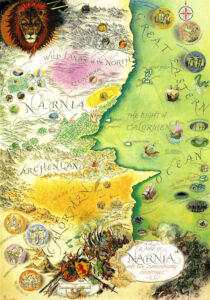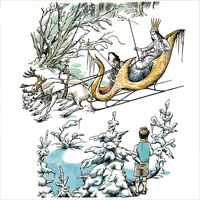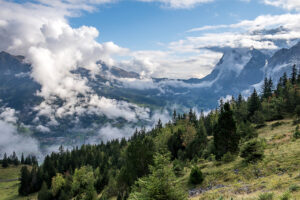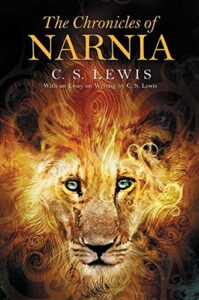It is time to meet Aslan the Great Lion, and visit Aslan’s Country.

from “Rambling Ever On” site
Last week’s Post (just in case you didn’t read it which, granted, is very hard to imagine…) included a short biography of C.S. Lewis, the “anonymous Orthodox”.
 Today we travel to Narnia.
Today we travel to Narnia.
The Chronicles of Narnia are six “children’s” books, written by Lewis in the early 1950s, about the land of Narnia, which exists in another “dimension” as we might say today, another universe. Even their time doesn’t relate directly to ours: A week here might be hundreds of years there, or vice versa.
Pauline Baynes, 1972
Above, I put “children’s” in quotes, because many adults read and re-read these books. Tolkien thought their symbolism was too obvious, but I love them and their simple profundity. They speak to me in a way which dry theology does not. Like all good “myth”, they stimulate my imagination. They make me think. They make me happy. They make me cry with joy. Their imagery stays with me, has been part of me for many years, now.

The stories tell of a number of English boys and girls who are led into Narnia through one or another of the “doors” which still exist in this world. In the first book which Lewis wrote, The Lion, the Witch and the Wardrobe, four children become Kings and Queens of Narnia, in fulfillment of ancient Narnian prophecy. Children from this world and the characters from Narnia, both human and the intelligent talking animals, have many adventures. They meet the great lion Aslan – Christ in that world. “Aslan’s Country” is what we call Heaven. Lewis intended to write only the one book, but both its popularity and his imagination caused him to write five more, in which children from this world are present from the time when Aslan creates Narnia out of nothing till the day He brings that world to an end.
The Chronicles of Narnia are filled with Scriptural and Patristic Christian imagery and concepts. However, they contain not a single “Christian” word. They plant the Christian way in children (and adults) without their realizing it. The books have thereby been read in places where overtly Christian material would not be allowed. Extraordinarily clever on Lewis’ part – or “devious” if you wish! Sometimes when secularists have realized what Narnia is really all about, they have banned it.
I suspect The Chronicles of Narnia are less read these days:
1 Because Narnia is medieval. Lewis was a professor of medieval literature, and in that respect he made Narnia to his liking. However, lords and ladies and knights and battles and royalty with their old courtly way of speaking are today very much out of fashion.
2 Because of the (now quaint) mid-Twentieth Century “British school colloquialisms” used by the children.

3 Because of some assumptions about femininity which are no longer acceptable. Today there would need to be more “girl heroes”, though brave, perceptive, sensible, faithful Lucy certainly is one in three of the books – and, come to think of it, so are Jill in The Silver Chair and Aravis in The Horse and His Boy. Furthermore, at the beginning Edmund was a traitor, and Eustace was a revolting kid, and Shasta was ignorant, though all three shaped up before the end with the help of three girls. So perhaps the modern criticisms are not entirely in order.
4 Because the villain in Narnia is a witch. However Satan in the Scriptures is portrayed as male. (Speaking as a male, I don’t much care for that either!)
5 Because Narnia’s enemies in Calormen to the south seem to be very much “north African” stereotypes.
However, work your way through that, and Narnia is charming, extraordinarily insightful, sometimes funny, and above all deeply and profoundly Christian.
Some Visits to Aslan’s Country
The children from this world are granted occasional visits to “Heaven”. Here is how Lewis described it. I think you’ll notice many similarities to Saint Ephraim of Syria’s Hymns on Paradise, from last week.
In what follows, Italics are my commentary. Non-italicized words are from the text of the books.
1 In The Voyage of the Dawn Treader, as their ship nears the “Utter East”, the waters grow sweet, they sail through a carpet of white lilies, the current draws them on, and the sun grows ever larger and brighter. Finally,
…beyond the sun… was a range of mountains. It was so high that either they never saw the top of it or they forgot it. None of them remembers seeing any sky in that direction. .. any mountains even a quarter of a twentieth of that height ought to have had ice and snow on them. But these were warm and green and full of forests and waterfalls however high you looked. And suddenly there came a breeze from the east… It lasted only a second or so but what it brought them in that second none of those three children will ever forget. It brought both a smell and a musical sound. Edmund and Eustace would never talk about it afterward. Lucy could only say, “It would break your heart.” “Why” said I, “was it so sad?” “Sad!!! No”, said Lucy.
 Finally they ran aground.
Finally they ran aground.
Between them and the foot of the sky there was something so white on the green grass that…they could hardly look at it. They came on and saw that it was a Lamb. “Come and have breakfast”, said the Lamb…” They sat down and ate the fish… it was the most delicious food they had ever tasted.” “Please, Lamb”, said Lucy, “is this the way to Aslan’s Country?” “Not for you”, said the Lamb. “For you the door to Asan’s Country is from your own world… there is a way into my country from all the worlds,” said the Lamb; but as he spoke his snowy white flushed into tawny gold and his size changed and he was Aslan himself, towering above them and scattering light from his mane.

“Oh, Aslan,” said Lucy, “Will you tell us how to get into your country from our world.” “I shall be telling you all the time”, said Aslan. “But I will not tell you how long or short the way will be; only that it lies across a river. But do not fear that, for I am the great Bridge Builder.”
This comes just before the end of “The Voyage of the Dawn Treader”, which is so beautiful and moving that sometimes I can’t bear to finish it.
2 In The Silver Chair, their friend Prince Caspian has been killed in battle. The children are taken to Aslan’s Country and to their astonishment there is Caspian! Eustace asks Aslan, “But hasn’t he – er – died?” “Yes”, said Aslan in a very quiet voice, almost as if he were laughing. “He has died. Most people have you know. Even I have. * There are very few who haven’t.”
- In the first book, Aslan is killed, then rises to life again.
Caspian asks Aslan to see a glimpse of the children’s world: “Is that wrong?” “You cannot want wrong things any more, now that you have died, my son,” said Aslan.
3 At the end of The Last Battle Aslan brings the faithful people and talking animals home into his Country. (The dogs especially loved it there.) Aslan calls the stars down from the skies. The sun grows red, then goes dark. The world of Narnia is gone.
Some, after having suffered a dreadful dirty death, found themselves suddenly fresh and clean and comfortably dressed. Even old people like Polly and Dignory from the first Chronicles were there, but Polly…was not old, and there were no gray hairs on her head and no wrinkles on her cheek…” Digory said “[Polly and I] chiefly felt that we’d been unstiffened. You youngsters wouldn’t understand. But we stopped feeling old.” *
- I am very much in favor of that.
Some of the children weren’t sure how they had got there. All they could remember was that they had been going to school by train, waiting on the platform. and the train was taking a curve much too fast, and suddenly a bang! and a feeling of lightness, and here they were.
…they stood on grass, the deep blue sky was overhead, and the air which blew gently on their faces was that of a day in early summer. Not far away from them rose a grove of trees, thickly leaved, but under every leaf … fruit such as no one has seen in our world. But dare they pluck them? Peter said “I’ve a feeling we’ve got to a country where everything is allowed.”
What was the fruit like? Unfortunately no one can describe a taste. .. If you had once eaten that fruit, all the nicest things in this world would taste like medicines after it… You can’t find out what it is like unless you can get to that country and taste it for yourself.
Though they were in Aslan’s Country, nevertheless they were so sad to have left Narnia behind. Then suddenly to their amazement they realized that Narnia was there! the old Narnia, but in some indescribable way glorified. (This is a Platonic idea: that this world is only a shadow of the Real Thing.) It was rather, Lewis wrote, like looking into a mirror, then turning around to see the real three-dimensional thing.
The unicorn says: “I have come home at last! This is my real country! I belong  here. This is the land I have been looking for all my life, though I never knew it. … come further up, come further in!”
here. This is the land I have been looking for all my life, though I never knew it. … come further up, come further in!”
And they began to run up the mountain… faster and faster they ascended, but no one got hot or tired or out of breath.
Aslan’s Country from “Paradox-Uganda”
Through a great pool without getting wet, up a great waterful, higher and higher. Soon the beloved people and talking creatures from Narnia’s history, in all the books, join them. Then… about half an hour later – or it might have been half a hundred years later, for time there is not like our time here… they enter a garden. From there the “lower world” behind them looked no bigger than grains of … salt. And within the garden… was not really a garden but a whole world… “Of course, daughter of Eve,… the further up and the further in you go, the bigger everything gets. The inside is larger than the outside.”
Finally they saw that the mountain, Aslan’s country, was… part of a great chain of mountains which ringed round the whole world… And ‘way far away, they see England!, the real England – and, with their new “eagle-eye” vision, their mother and father waving to them across the great deep valley – all making the same journey “further up and further in”.
Finally they saw Aslan, who assured them that they need never go back again. The railway accident on their way to school had been real… and now they were in His Country for good.
And as He spoke He no longer looked to them like a lion; but the things that began to happen after that were so great and beautiful that I cannot write them. And for us this is the end of all the stories… but for them it was only the beginning of the real story. All their life in this world and all their adventures in Narnia had only been the  cover and the title page: now at last they were beginning Chapter One of the Great Story which no one on earth has read: which goes on forever: in which every chapter is better than the one before.
cover and the title page: now at last they were beginning Chapter One of the Great Story which no one on earth has read: which goes on forever: in which every chapter is better than the one before.
Forgive me: I’m starting to cry. Please, dear God, let it be so. My time is coming. Let it be like this.
C.S. Lewis died on November 22, 1963. His death was scarcely noted, for perhaps you know who else died on that day.
____________________________________________
If you haven’t read these lovely stories, please, please do so. Don’t hesitate. You’re old enough to read fairy tales again.
I hope whoever has the copyright to Narnia (it’s in dispute) doesn’t mind my quoting from and thereby promoting these books. They’re available from Amazon, Ancient Faith and many other sources.
They are also beautifully read by Dr. Chrissi Hart on podcasts from Ancient Faith: https://www.ancientfaith.com/podcasts/series/the_chronicles_of_narnia
And this is the end of what unexpectedly turned out to be not one, not two, not three, but four Posts on the Heavenly Mountain, which turns the popular concept down-side up. I am not trying to make a pun when I say I feel genuinely uplifted.
Next Week: A 20th Century Holy Man – John Maximovitch, a Saint of Three Continents
Week after Next: It’s summer – time to travel! Two Weeks in Greece with a taste of old-country Orthodoxy, among others things.